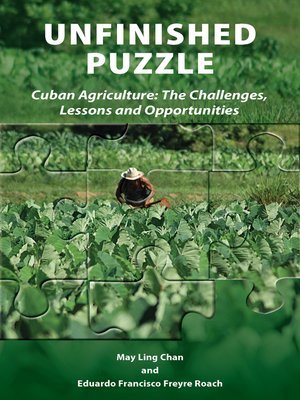Unfinished Puzzle
ebook ∣ Cuban Agriculture: The Challenges, Lessons & Opportunities
By May Ling Chan

Sign up to save your library
With an OverDrive account, you can save your favorite libraries for at-a-glance information about availability. Find out more about OverDrive accounts.
Find this title in Libby, the library reading app by OverDrive.



Search for a digital library with this title
Title found at these libraries:
| Library Name | Distance |
|---|---|
| Loading... |
Cuba is widely recognized for its social achievements including health care, education, social security, subsidized food and other benefits and opportunities, despite well-meaning, or sometimes not so well-meaning, international criticisms. For more than 50 years, this Caribbean island has defended and sustained these economic, political, social and cultural gains, and has maintained a commitment to humanitarianism and international solidarity that persists to this day.
Part one of Unfinished Puzzle describes the socioeconomic context of Cuban agriculture, the natural environment that affect it and the international political context in which it has developed. Part two explores the unique agricultural policies Cubans implemented to confront the food and economic crises of the early 1990s. Finally, part three examines the lessons to be learned from the Cuban experience with respect to local development, sustainable agriculture, agroecology, food security and food sovereignty. It highlights the elements of the Cuban system most suitable for replication in other countries facing similar circumstances or challenges.
Part one of Unfinished Puzzle describes the socioeconomic context of Cuban agriculture, the natural environment that affect it and the international political context in which it has developed. Part two explores the unique agricultural policies Cubans implemented to confront the food and economic crises of the early 1990s. Finally, part three examines the lessons to be learned from the Cuban experience with respect to local development, sustainable agriculture, agroecology, food security and food sovereignty. It highlights the elements of the Cuban system most suitable for replication in other countries facing similar circumstances or challenges.







